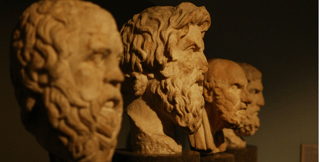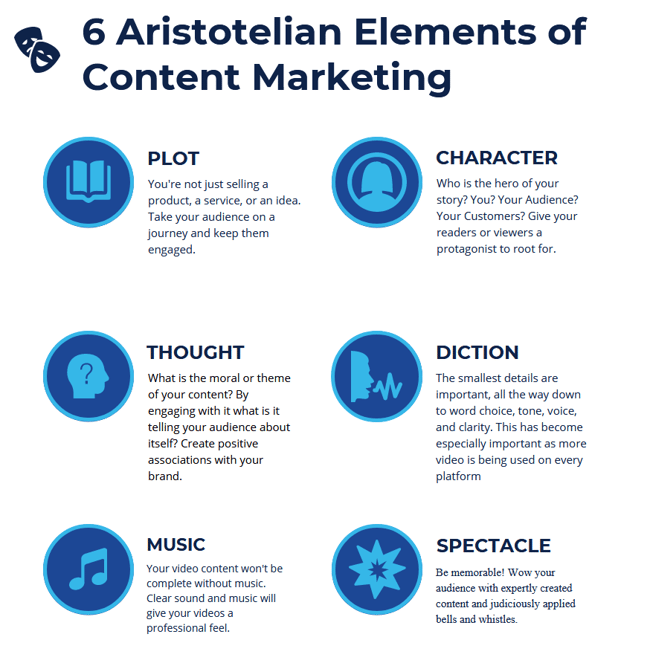The 6 Aristotelian Elements of Content Marketing

At its most basic, content marketing is about narrative building. At its extra-most basic, content marketing follows an incredibly simple 2-part narrative structure: Problem → Solution. While that simplified structure might work in some situations (you need food? I sell food! Problem solved.) you’re missing a huge opportunity to really connect with your audience.
Instead of this simplified model, consider building a more highly narrative story, taking into account the buyer’s journey and beyond. There is a lot of great advice about storytelling, but I always like to return to a foundational expert of writing, philosophy, and drama: Aristotle.
The Elements of Drama
“How can a Greek philosopher who lived almost 2500 years ago teach us anything about marketing?” you might ask. Fair question. Writing advice often over-complicates things. That can be especially true when you’re trying to reach your goals, engage an audience, and build your brand. What is great about Aristotle’s guidelines is simplicity.

Aristotle and Friends
Aristotle was born in 384 BC, but his thoughts on drama have been at the heart of writing curricula pretty much since that time. In Poetics, he wrote that drama (specifically tragedy) has to include 6 elements: plot, character, thought, diction, music, and spectacle.
Plot
Aristotle says: “The plot, then, is the first principle, and, as it were, the soul of a tragedy”
Alex says: Simply put, your content has to be telling a story. Take your audience on a journey and keep them engaged throughout. This is the best way to build relationships, create trust, keep people coming back, and ultimately convert. Get people emotionally invested in the story that you’re telling.
Character
Aristotle says: “Character is that which reveals moral purpose, showing what kind of things a man chooses or avoids”
Alex says: Who is the hero of your story? You? Your audience? Your customer? Their customer? The answer to this question will change depending on your product or service, or if you’re B2B or B2C. Resist the temptation to make your brand the hero all the time. Sometimes a customer testimonial may make more of an impact than a simple promotional video.
Thought
Aristotle says: “Thought is the faculty of saying what is possible and pertinent in given circumstances”
Alex says: What is the moral or the theme of your content? By engaging with it what is it telling your audience about itself? Think of how successful TOMS shoes have been - whenever you buy a pair of their shoes they donate a pair to someone in need. Their brand has a clear mission and point of view, and they’ve leveraged that into incredible brand recognition and success. That’s just one example. The moral or theme of your brand can be a feeling, a style, or even a status symbol.
Diction
Aristotle says: “Diction; by which I mean, as has been already said, the expression of the meaning in words; and its essence is the same both in verse and prose.”
Alex says: Word choice, tone, voice, clarity - all of these elements of content are becoming especially important as more video is being used in content marketing. There is a huge difference between content that is read, content spoken in a voiceover, and content delivered by someone speaking to the camera. If you’re incorporating video into your content library (and you absolutely should!) you have to think of more than the writing itself.
Music
Aristotle says: “Song holds the chief place among the embellishments”
Alex says: Again, this element of drama is growing in importance as more video comes into play. A video with just voiceover feel awkward - even the news is not delivered with complete silence in the background.
Spectacle
Aristotle says: “The Spectacle has, indeed, an emotional attraction of its own, but, of all the parts, it is the least artistic”
Alex says: Make sure your content is memorable. Aristotle thought that spectacle was the basest of the six elements, and in this area I think the most has changed since Ancient Greece. This is where viral content comes from and just one piece of viral content is the thing of any good content marketer’s dreams.
Grounded Yet Fantastic
The simple tools we now have for creating engaging and interesting content are outrageous. But without structure and grounding it is easy to let the tools take over. Leverage as many of those tools as you can to make content that is rooted in these six elements, and keep your audience delighted with quality content that appeals to a well-trod and familiar history of narrative. Convert new contacts and continue to provide value to leads, current customers, and clients by keeping all of your content - from blogs, to social media, to videos - by creating content tethered to a clear narrative. (And if you need a quick reminder, I made you an infographic.)


